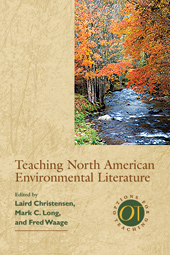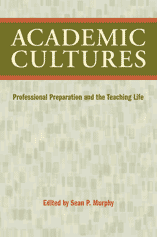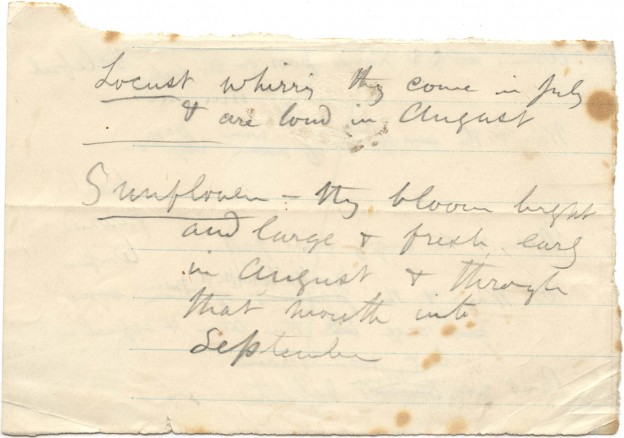Someone asked me the other day about my scholarship and I promised to post something about my recent writing. Here is a summary of my contributions to ongoing conversations about American poetry, environmental writing and the profession of English.
American Poetry
 I began writing about American poetry with two peer-reviewed journal articles: one on the poet Denise Levertov and one on William Carlos Williams. In 2004, my work on Williams continued with “Ideas as Forms of Beauty: William Carlos Williams’s Paterson and A. R. Ammons’s Tape for the Turn of Year,” an essay that appeared in the book Rigor of Beauty: Essays in Commemoration of William Carlos Williams. More recently, my work in American poetry and poetics has contributed to the emerging field of ecopoetry. My essay “William Carlos Williams, Ecocriticism, and Contemporary American Poetry” appeared in the book Ecological Poetry: A Critical Introduction. Two additional essays were published this fall: a 10,000 word overview of the life and writing of A. R. Ammons, commissioned by the Dictionary of Literary Biography, and a 10,000 word critical history of the relationship between poetry and ecology that appeared in a multi-volume anthology entitled Reading in Contemporary America. In addition, since 2003, I’ve published shorter reference entries on the American poets William Carlos Williams, Theodore Roethke, Mary Oliver, W. S. Merwin, Gary Snyder, and Denise Levertov. I also regularly review new books of American poetry for ISLE: Interdisciplinary Studies in Literature and Environment. My most recent review is Mary Oliver’s book of poetry Thirst.
I began writing about American poetry with two peer-reviewed journal articles: one on the poet Denise Levertov and one on William Carlos Williams. In 2004, my work on Williams continued with “Ideas as Forms of Beauty: William Carlos Williams’s Paterson and A. R. Ammons’s Tape for the Turn of Year,” an essay that appeared in the book Rigor of Beauty: Essays in Commemoration of William Carlos Williams. More recently, my work in American poetry and poetics has contributed to the emerging field of ecopoetry. My essay “William Carlos Williams, Ecocriticism, and Contemporary American Poetry” appeared in the book Ecological Poetry: A Critical Introduction. Two additional essays were published this fall: a 10,000 word overview of the life and writing of A. R. Ammons, commissioned by the Dictionary of Literary Biography, and a 10,000 word critical history of the relationship between poetry and ecology that appeared in a multi-volume anthology entitled Reading in Contemporary America. In addition, since 2003, I’ve published shorter reference entries on the American poets William Carlos Williams, Theodore Roethke, Mary Oliver, W. S. Merwin, Gary Snyder, and Denise Levertov. I also regularly review new books of American poetry for ISLE: Interdisciplinary Studies in Literature and Environment. My most recent review is Mary Oliver’s book of poetry Thirst.
Environmental Writing and Ecocriticism
 Four years of work with co-editors Laird Christensen and Fred Waage has resulted in the publication of Teaching North American Environmental Literature (MLA 2008). Our book provides a center of access to the range of pedagogical possibilities for teaching environmental literature. The collection includes over thirty contributors and features essays on the environmental literatures of Canada as well as Mexican and Mexican-American environmental literature. The book includes a section for further reading, “Resources for Teaching Environmental Literature: A Selective Guide.” Before my last promotion I published the essay “Education and Environmental Literacy: Teaching Ecocomposition in Keene State College’s Environmental House” that appeared in Ecocomposition: Theoretical and Pedagogical Approaches. This publication has led to a series of publications on environmental writers and ecocriticism. In 2004 I published a 12,000 word entry on John McPhee in Dictionary of Literary Biography: Twentieth-Century Nature Writers: Prose. My essay “Ecocriticism and the Practice of Reading” appeared in the fall of 2006 special issue of the journal Reader: Essays in Reader-Oriented Theory, Criticism, and Pedagogy that I guest edited. Reader is a semiannual publication that generates discussion on reader-response theory, criticism, and pedagogy. My essay, and the special issue, is focused around the relationship between reading and ecological thinking.
Four years of work with co-editors Laird Christensen and Fred Waage has resulted in the publication of Teaching North American Environmental Literature (MLA 2008). Our book provides a center of access to the range of pedagogical possibilities for teaching environmental literature. The collection includes over thirty contributors and features essays on the environmental literatures of Canada as well as Mexican and Mexican-American environmental literature. The book includes a section for further reading, “Resources for Teaching Environmental Literature: A Selective Guide.” Before my last promotion I published the essay “Education and Environmental Literacy: Teaching Ecocomposition in Keene State College’s Environmental House” that appeared in Ecocomposition: Theoretical and Pedagogical Approaches. This publication has led to a series of publications on environmental writers and ecocriticism. In 2004 I published a 12,000 word entry on John McPhee in Dictionary of Literary Biography: Twentieth-Century Nature Writers: Prose. My essay “Ecocriticism and the Practice of Reading” appeared in the fall of 2006 special issue of the journal Reader: Essays in Reader-Oriented Theory, Criticism, and Pedagogy that I guest edited. Reader is a semiannual publication that generates discussion on reader-response theory, criticism, and pedagogy. My essay, and the special issue, is focused around the relationship between reading and ecological thinking.
My sabbatical offered me the time to write and present a plenary talk at an international conference in Hyderabad, India, “Shifting Ground: The Emergence of the Bioregion and the Watershed in the Teaching of North American Environmental Literature.” A revised version of this talk appeared this fall in the inaugural 2008 issue of the Indian Journal of Ecocriticism. I’ve also written a review of the first collection of essays on environmental literature and theory published in India, Essays in Ecocriticism, that will appear in ta forthcoming issue of ISLE: Interdisciplinary Studies in Literature and Environment.
The Profession of English Studies
 For over ten years I have been writing about the profession of English. As a graduate student, while co-directing the Expository Writing Program at the University of Washington, I co-wrote and published the essay “Graduate Students, Professional Development Programs, and the Future(s) of English Studies” in the journal WPA: Writing Program Administration. Since arriving at Keene State College, my work in this area has focused on the intellectual work of English in particular institutional sites. In 2004, a Keene State College Faculty Development Pool Grant enabled me to travel to the Association of the Departments of English (ADE) Summer Seminar to broaden my perspective as a scholar interested in the profession of English. Moreover, serving for three years as a member (and for one year as Chair) of the MLA Committee on Academic Freedom and Professional Rights and Responsibilities (CAFPRR) furthered my understanding of the general conditions of the field of English studies and the professional lives of teachers and scholars. My subsequent inquiry into graduate training, the professional identity of faculty, and the small college department has been disseminated in a series of publications, book reviews and conference presentations. In 2005 I was invited to write a featured “Commentary” on the small college department, that I titled “Where Do You Teach?”, for the fall 2005 issue of the journal Pedagogy: Critical Approaches to Teaching Literature, Language, Composition, and Culture. And my essay “Reading, Writing and Teaching in Context,” appeared in the book Academic Cultures: Professional Preparation and the Teaching Life (MLA 2008). This essay takes as its subject the representation of faculty work in terms of research and teaching as separate activities. My argument is that this pervasive subplot in the narrative of the profession is rooted in a representation of faculty work that transcends the local institution and the ways that departments and institutions define intellectual work.
For over ten years I have been writing about the profession of English. As a graduate student, while co-directing the Expository Writing Program at the University of Washington, I co-wrote and published the essay “Graduate Students, Professional Development Programs, and the Future(s) of English Studies” in the journal WPA: Writing Program Administration. Since arriving at Keene State College, my work in this area has focused on the intellectual work of English in particular institutional sites. In 2004, a Keene State College Faculty Development Pool Grant enabled me to travel to the Association of the Departments of English (ADE) Summer Seminar to broaden my perspective as a scholar interested in the profession of English. Moreover, serving for three years as a member (and for one year as Chair) of the MLA Committee on Academic Freedom and Professional Rights and Responsibilities (CAFPRR) furthered my understanding of the general conditions of the field of English studies and the professional lives of teachers and scholars. My subsequent inquiry into graduate training, the professional identity of faculty, and the small college department has been disseminated in a series of publications, book reviews and conference presentations. In 2005 I was invited to write a featured “Commentary” on the small college department, that I titled “Where Do You Teach?”, for the fall 2005 issue of the journal Pedagogy: Critical Approaches to Teaching Literature, Language, Composition, and Culture. And my essay “Reading, Writing and Teaching in Context,” appeared in the book Academic Cultures: Professional Preparation and the Teaching Life (MLA 2008). This essay takes as its subject the representation of faculty work in terms of research and teaching as separate activities. My argument is that this pervasive subplot in the narrative of the profession is rooted in a representation of faculty work that transcends the local institution and the ways that departments and institutions define intellectual work.


